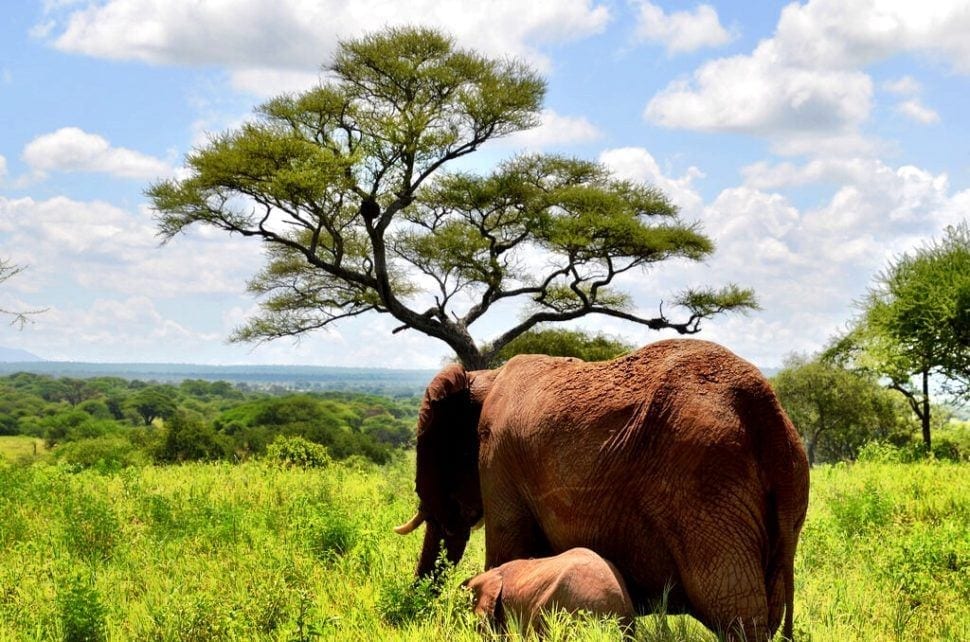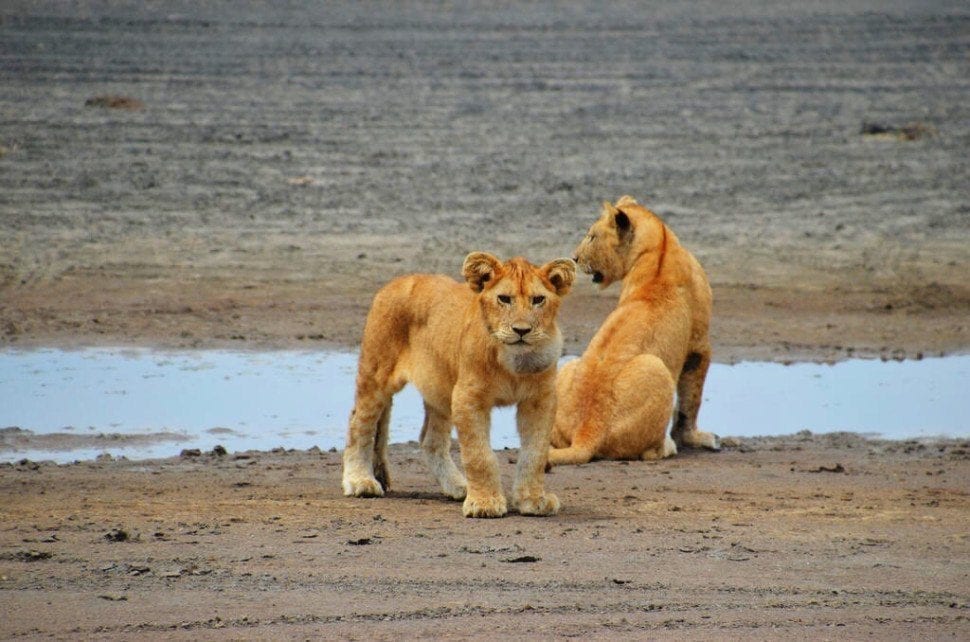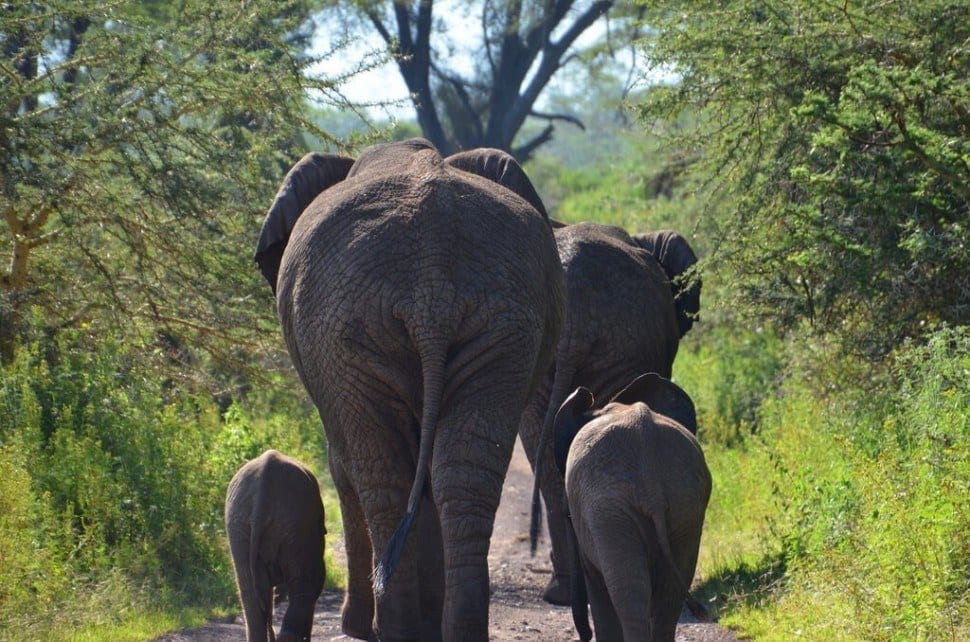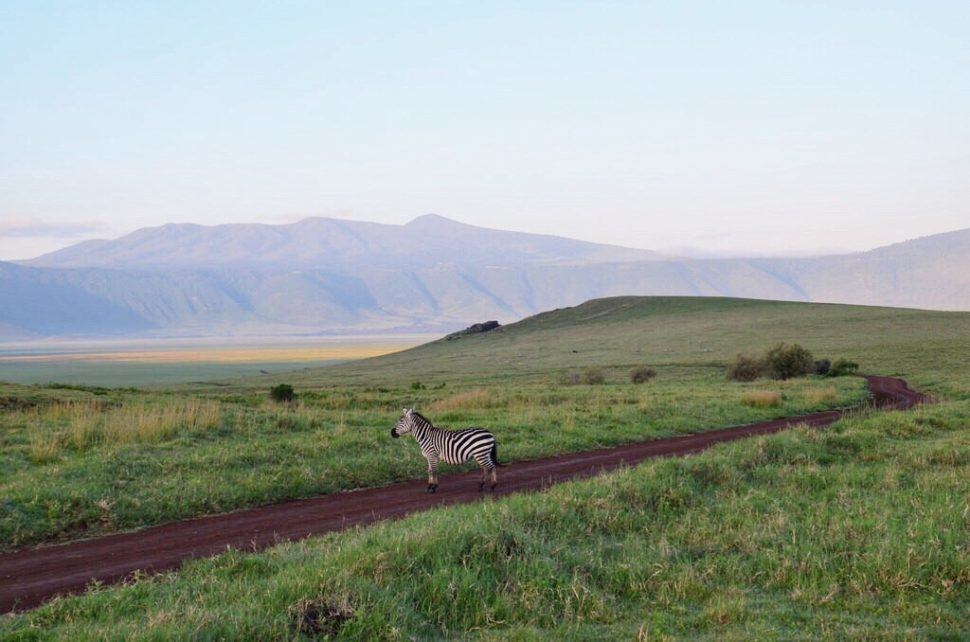
The safari truck rocked with every bump, our guide Ima kept an eye on the road as well as the tall grasses, looking for any sign of movement. Suddenly he stopped the truck, put it into park and killed the engine. He pulled out his massive pair of binoculars and pointed saying, “Look there, in the distance!” I didn’t see much except for a black dot. I watched though and noticed it was moving, meandering through the savanna almost haphazardly. It was a rhino and we sat there in silence, staring as he gradually came into view. The size of a car, he didn’t even pause as he came to the dirt road and the sudden assemblage of safari trucks all there for one reason, to watch him. No, without pause he simply crossed the road and continued his drunken march into the grasslands, eventually disappearing as mysteriously as he had appeared. I was in the real world version of the Garden of Eden, Tanzania’s Ngorongoro Crater enjoying the safari experience of a lifetime.
I was on a weeklong safari in Tanzania with the best in the business, Abercrombie & Kent. This luxury tour provider pioneered the concept of not just the modern safari, but also the ethos of enjoying the wildlife not with a gun, but with a camera. Although I had been on safari in Africa before, my time in Tanzania went well above and beyond anything I had experienced before, and had the effect which strikes all safari participants, a renewed commitment not just to wildlife preservation and conversation, but a broader more holistic view on how we as humans interact with the natural world around us.

Ties That Bind
I have always been a fierce advocate of conservation and animal protection; it’s just part of who I am. But I’m not going to lay out an argument here today that we should protect animals for the sheer fact we shouldn’t let a species go extinct. Frankly, that argument is well known and if you aren’t moved by it then I won’t further convince you, although it personally shocks me. No, instead everyone should care about not just the animals that call the planet home, but their ecosystems as well because their survival directly impacts our own. We all share this planet, we all exist together and none of us do so independent of the other. It’s a puzzle, a beautiful one, in which each piece has a place and every actor their role. A good example of this interdependence is the not-at-all-sexy, but still vitally important topic of sea grass.
Sea turtles are one of the few animals that feed on sea grass. This grass needs to be constantly cut short by the turtles, and other marine life, in order to remain healthy. Just like cows, the turtles feed on the grass and in the process help it grow and remain viable. Recently there has been a decline in naturally occurring sea grass beds, which can be causally linked to the decline of sea turtles over the same period. So what, you may ask? Well, these sea grass beds provide breeding grounds for fish and other marine life, without which they wouldn’t exist and many foods we humans eat will cease to be or exist in such low numbers that we can’t harvest them. It’s a chain reaction, the lower level fish disappear which means that the middle and higher level fish don’t have anything to eat. So if the turtles go extinct, the cascading effect will be tremendous and absolutely will affect mankind.
This is but one example of thousands proving the importance of keeping connections linked through the conservation of wildlife species. And given the sharp increase in extinctions over the last century, we absolutely need to be concerned.

Facts and Emotions
There’s a reason why I felt the need to write this post today. Recently, it was leaked that the Trump Administration is close to lifting the ban on imports of elephant trophies from Zimbabwe and Zambia. Let’s be clear, under current policy such trophies are allowed from some countries, the key to the lifting of the ban is whether or not a country can demonstrate that killing them positively enhances the survival of the species. Whether through enormous fees paid by hunters or more conservation-based reasons, some countries have adequately proven this to the US Fish & Wildlife Service, even though I personally may not agree with it. The shift in policy only affects two countries, Zambia and Zimbabwe, but the effects of lifting the ban would be far more wide-ranging than just these two countries.
Zimbabwe has a particularly atrocious record of wildlife protection, as the 2015 case of Cecil the Lion shows. A notoriously corrupt regime, Zimbabwe hasn’t just failed at protecting elephants, officials have played an active role in both poaching and the illegal trade in ivory. Since 2001, Zimbabwe’s elephant population has declined by 6% and there’s causal evidence that poaching has increased in areas where trophy hunting is permitted. The country doesn’t have a conservation management plan, lacks key data and has no real way of monitoring much less protecting its wildlife population. These are facts, not opinions, and all point towards a country that has not lived up to the high standards set by the USFWS. These points are further underscored by the political upheaval currently underway in the country, which in turn means that it will take years before wildlife protection is a concern for the government, if it ever is at all.

Zambia too has failed to adequately protect its elephant and lion populations over the years. According to the Great Elephant Census, the elephant population in Zambia decreased from 200,000 in 1972 to 21,000 in 2016. Ivory trafficking remains a systemic problem with no signs of abatement, further threatening to eliminate the country’s elephant population forever.
In the United States, it is true that a well-managed and regulated regime of hunting and fishing does in fact help the animals being hunted. But we’re talking about deer and trout, not elephants and lions. Both elephants and lions are endangered species, threatened to the point of complete and total extinction. If money is what the countries need to help protect them, then surely there are other sources for that revenue. I was reminded of that last week while reading an article in which the Chairman and CEO of Abercrombie & Kent, Geoffrey Kent was quoted, “hunting is not sustainable and provides cover for the illegal trade in ivory.” It’s absolutely true and unless you’re very well immersed in the subject, is a fact that many may overlook. Allowing even limited hunting sets an example to others, it says that it’s ok to take these animals, encouraging even more poaching in the countries least able to control it.

Our Responsibility
As travelers, we all have a responsibility to leave no trace, to leave the places we visit the same as we found them, maybe even a little bit improved if at all possible. For me, a cornerstone of this duty is traveling in a manner that is both responsible and sustainable. But it’s not easy. Even for the most experienced travelers, it can be very difficult to understand what experiences are beneficial and which ones may do actual harm. This is where education and working with the right partners is key, whether it means traveling with safari providers with a long and proven track record or volunteering at the Elephant Nature Park in Thailand. But it is our responsibility to seek out these professionals and the resources available. We are the ones who ultimately encourage immoral or even illegal activities. If we choose to protect instead of destroy, the money will follow and so will the results.
This is not an easy topic to write about, especially when I’m so used to heralding all of the positive aspects of the travel experience. And while my own professional background was in politics, it’s not what I wanted to talk about today. Ultimately, this is not a political issue at all, at least it shouldn’t be. Hunters and conservationists are both liberal and conservative, rich and poor. No, this isn’t a political divide, it’s a moral one. It is a series of decisions that individuals must make if they truly want to ensure that not just these critically endangered animals are protected, but the world as we know it is the same for our grandchildren as it is for us. Don’t you want your kids’ kids to have the opportunity to ride in a safari truck and make the same awe-inspiring discoveries? To be changed by what they experience and to in turn pass that down to future generations? The only way that can happen is if we make the right decisions today, and I hope beyond hope that as a society we understand that fact and take action before it’s too late.
